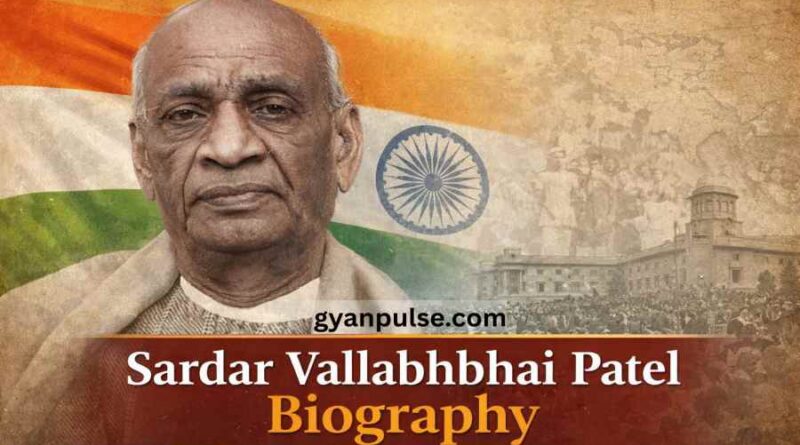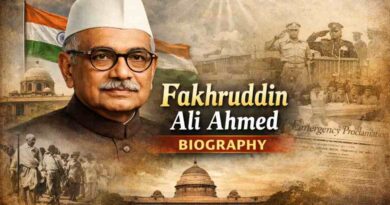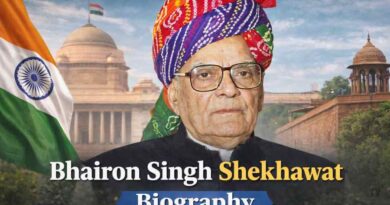Sardar Vallabhbhai Patel Biography – The Iron man of India’s Freedom movement
Explore the inspiring life, leadership, and legacy of India’s Iron Man in this Sardar Vallabhbhai Patel Biography, uniting the nation with vision and courage.
Sardar Vallabhbhai Patel Biography
Sardar Vallabhbhai Patel, famously called the ‘Iron Man of India,’ was a key leader in India’s fight for freedom. Born on 31 October 1875, in Nadiad, Gujarat, Patel went on to become India’s first Deputy Prime Minister and first Home Minister after independence. His unparalleled leadership, administrative prowess, and iron will earned him a special place in Indian history.
Table of Contents
Early Life and Education
Vallabhbhai Patel was born into a humble farming family. Growing up with strong moral values, he showed leadership qualities even as a boy. Despite financial struggles, Patel pursued his education diligently. After completing school, Patel traveled to England and became a barrister at the prestigious Middle Temple Inn in London. After coming back to India as a well-qualified lawyer, he started his practice in Ahmedabad and soon dedicated himself to helping people.
Role in the Freedom Movement
Inspired by Mahatma Gandhi’s ideals of non-violent resistance, Patel became an active participant in the Indian freedom struggle. In 1917, Patel played a key role in the Kheda Satyagraha, leading farmers against unjust British taxes. Later, he led the famous Bardoli Satyagraha in 1928, successfully forcing the British to reduce the tax rates. His courageous leadership earned him the title of “Sardar,” which means leader or chief.
Patel was instrumental in organizing peasants, workers, and farmers into a disciplined political force. Throughout his political career, he remained committed to Gandhian principles and the Indian National Congress’s goals of self-rule.
Unification of India
After India gained independence in 1947, Patel took up the critical task of integrating over 560 princely states into the Indian Union. This was a challenging mission, as many rulers were reluctant to join India. Demonstrating unmatched political skill and determination, Patel successfully unified the nation. The integration of Hyderabad, Junagadh, and Jammu & Kashmir under India is a testament to his strategic brilliance. Due to these achievements, Patel is revered as the “architect of modern India.”
Sardar Patel’s Vision of National Unity and Strong Governance
Sardar Vallabhbhai Patel’s greatest contribution to India lies in his clear vision of a united and well-governed nation. At a time when regional divisions and political uncertainty threatened national stability, Patel emphasized unity, discipline, and efficient administration. His firm yet practical approach helped lay the foundation of a strong central government, ensuring that India emerged as a cohesive republic rather than a fragmented state.
Leadership as Deputy Prime Minister and Home Minister
As India’s first Deputy Prime Minister and Home Minister, Patel was instrumental in creating important policies and building the base for a strong and united India. Patel also oversaw the creation of the All-India Services (IAS, IPS) to establish a robust administrative setup and ensure uniform governance across the nation.
Also Read: Jawaharlal Nehru Biography: Life, Role in Freedom Struggle, and Legacy
5 Important Life Lessons from Sardar Vallabhbhai Patel
- Embrace Discipline and Integrity
Sardar Patel practiced strict discipline and maintained high moral integrity. His example reminds us that personal character is the foundation of true leadership. - Unity is Strength
Sardar Patel dedicated his life to bringing people together, demonstrating that true strength lies in unity and harmony. - Determination Can Overcome Any Obstacle
Known for his iron will, Patel showed that unwavering determination can help achieve even the most difficult goals. - Serve Selflessly for the Greater Good
Throughout his life, Patel put the nation first. His selfless service is a reminder that working for the welfare of society is the most noble pursuit. - Stay Calm in Crisis
Patel faced countless political and social challenges. His composed and pragmatic approach to resolving conflicts underscores the power of calm leadership.
Legacy and the Statue of Unity
Sardar Vallabhbhai Patel passed away on 15 December 1950, leaving behind a remarkable legacy that continues to inspire. His contributions to the unification of India and his visionary leadership are celebrated every year on National Unity Day (Rashtriya Ekta Diwas), observed on his birth anniversary.
In 2018, the world’s tallest statue – the Statue of Unity – was unveiled in Gujarat to honor his indomitable spirit. Standing at a height of 182 meters, this monument pays tribute to Sardar Patel’s enduring influence.
Summary
Sardar Vallabhbhai Patel’s life is a powerful example of patriotism, resilience, and commitment to national integrity. Known as the Iron Man of India, he dedicated himself to building a united and strong India. Even decades after his passing, Patel’s contributions inspire generations to come.
Also Check: Biography
![]()




